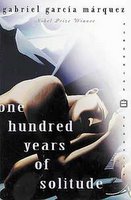
"One Hundred Years of Solitude is the first piece of literature since the Book of Genesis that should be required reading for the entire human race....Mr. García Márquez has done nothing less than to create in the reader a sense of all that is profound, meaningful, and meaningless in life."
The story follows 100 years in the life of Macondo, a village founded by José Arcadio Buendía and occupied by descendants all sporting variations on their progenitor's name: his sons, José Arcadio and Aureliano, and grandsons, Aureliano José, Aureliano Segundo, and José Arcadio Segundo. Then there are the women--the two Úrsulas, a handful of Remedios, Fernanda, and Pilar--who struggle to remain grounded even as their menfolk build castles in the air. If it is possible for a novel to be highly comic and deeply tragic at the same time, then One Hundred Years of Solitude does the trick. Civil war rages throughout, hearts break, dreams shatter, and lives are lost, yet the effect is literary pentimento, with sorrow's outlines bleeding through the vibrant colors of García Márquez's magical realism. Consider, for example, the ghost of Prudencio Aguilar, whom José Arcadio Buendía has killed in a fight. So lonely is the man's shade that it haunts Buendía's house, searching anxiously for water with which to clean its wound. Buendía's wife, Úrsula, is so moved that "the next time she saw the dead man uncovering the pots on the stove she understood what he was looking for, and from then on she placed water jugs all about the house."
With One Hundred Years of Solitude Gabriel García Márquez introduced Latin American literature to a world-wide readership. Translated into more than two dozen languages, his brilliant novel of love and loss in Macondo stands at the apex of 20th-century literature.
No comments:
Post a Comment